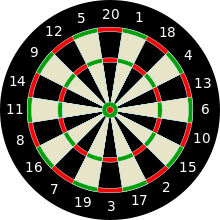20 (number)
20 (twenty) is the natural number following 19 and preceding 21. A group of twenty units may also be referred to as a score.[1][2]
| ||||
|---|---|---|---|---|
[[{{#expr: (floor({{{number}}} div {{{factor}}})) * {{{factor}}}+({{{1}}}*{{{factor}}} div 10)}} (number)|{{#switch:{{{1}}}|-1={{#ifexpr:(floor({{{number}}} div 10)) = 0|-1|←}}|10=→|#default={{#expr:(floor({{{number}}} div {{{factor}}})) * {{{factor}}}+({{{1}}}*{{{factor}}} div 10)}}}}]] [[{{#expr: (floor({{{number}}} div {{{factor}}})) * {{{factor}}}+({{{1}}}*{{{factor}}} div 10)}} (number)|{{#switch:{{{1}}}|-1={{#ifexpr:(floor({{{number}}} div 10)) = 0|-1|←}}|10=→|#default={{#expr:(floor({{{number}}} div {{{factor}}})) * {{{factor}}}+({{{1}}}*{{{factor}}} div 10)}}}}]] [[{{#expr: (floor({{{number}}} div {{{factor}}})) * {{{factor}}}+({{{1}}}*{{{factor}}} div 10)}} (number)|{{#switch:{{{1}}}|-1={{#ifexpr:(floor({{{number}}} div 10)) = 0|-1|←}}|10=→|#default={{#expr:(floor({{{number}}} div {{{factor}}})) * {{{factor}}}+({{{1}}}*{{{factor}}} div 10)}}}}]] [[{{#expr: (floor({{{number}}} div {{{factor}}})) * {{{factor}}}+({{{1}}}*{{{factor}}} div 10)}} (number)|{{#switch:{{{1}}}|-1={{#ifexpr:(floor({{{number}}} div 10)) = 0|-1|←}}|10=→|#default={{#expr:(floor({{{number}}} div {{{factor}}})) * {{{factor}}}+({{{1}}}*{{{factor}}} div 10)}}}}]] [[{{#expr: (floor({{{number}}} div {{{factor}}})) * {{{factor}}}+({{{1}}}*{{{factor}}} div 10)}} (number)|{{#switch:{{{1}}}|-1={{#ifexpr:(floor({{{number}}} div 10)) = 0|-1|←}}|10=→|#default={{#expr:(floor({{{number}}} div {{{factor}}})) * {{{factor}}}+({{{1}}}*{{{factor}}} div 10)}}}}]] [[{{#expr: (floor({{{number}}} div {{{factor}}})) * {{{factor}}}+({{{1}}}*{{{factor}}} div 10)}} (number)|{{#switch:{{{1}}}|-1={{#ifexpr:(floor({{{number}}} div 10)) = 0|-1|←}}|10=→|#default={{#expr:(floor({{{number}}} div {{{factor}}})) * {{{factor}}}+({{{1}}}*{{{factor}}} div 10)}}}}]] [[{{#expr: (floor({{{number}}} div {{{factor}}})) * {{{factor}}}+({{{1}}}*{{{factor}}} div 10)}} (number)|{{#switch:{{{1}}}|-1={{#ifexpr:(floor({{{number}}} div 10)) = 0|-1|←}}|10=→|#default={{#expr:(floor({{{number}}} div {{{factor}}})) * {{{factor}}}+({{{1}}}*{{{factor}}} div 10)}}}}]] [[{{#expr: (floor({{{number}}} div {{{factor}}})) * {{{factor}}}+({{{1}}}*{{{factor}}} div 10)}} (number)|{{#switch:{{{1}}}|-1={{#ifexpr:(floor({{{number}}} div 10)) = 0|-1|←}}|10=→|#default={{#expr:(floor({{{number}}} div {{{factor}}})) * {{{factor}}}+({{{1}}}*{{{factor}}} div 10)}}}}]] [[{{#expr: (floor({{{number}}} div {{{factor}}})) * {{{factor}}}+({{{1}}}*{{{factor}}} div 10)}} (number)|{{#switch:{{{1}}}|-1={{#ifexpr:(floor({{{number}}} div 10)) = 0|-1|←}}|10=→|#default={{#expr:(floor({{{number}}} div {{{factor}}})) * {{{factor}}}+({{{1}}}*{{{factor}}} div 10)}}}}]] [[{{#expr: (floor({{{number}}} div {{{factor}}})) * {{{factor}}}+({{{1}}}*{{{factor}}} div 10)}} (number)|{{#switch:{{{1}}}|-1={{#ifexpr:(floor({{{number}}} div 10)) = 0|-1|←}}|10=→|#default={{#expr:(floor({{{number}}} div {{{factor}}})) * {{{factor}}}+({{{1}}}*{{{factor}}} div 10)}}}}]] [[{{#expr: (floor({{{number}}} div {{{factor}}})) * {{{factor}}}+({{{1}}}*{{{factor}}} div 10)}} (number)|{{#switch:{{{1}}}|-1={{#ifexpr:(floor({{{number}}} div 10)) = 0|-1|←}}|10=→|#default={{#expr:(floor({{{number}}} div {{{factor}}})) * {{{factor}}}+({{{1}}}*{{{factor}}} div 10)}}}}]] [[{{#expr: (floor({{{number}}} div {{{factor}}})) * {{{factor}}}+({{{1}}}*{{{factor}}} div 10)}} (number)|{{#switch:{{{1}}}|-1={{#ifexpr:(floor({{{number}}} div 10)) = 0|-1|←}}|10=→|#default={{#expr:(floor({{{number}}} div {{{factor}}})) * {{{factor}}}+({{{1}}}*{{{factor}}} div 10)}}}}]] | ||||
| Cardinal | twenty | |||
| Ordinal | 20th (twentieth) | |||
| Numeral system | vigesimal | |||
| Factorization | 22 × 5 | |||
| Divisors | 1, 2, 4, 5, 10, 20 | |||
| Greek numeral | Κ´ | |||
| Roman numeral | XX | |||
| Binary | 101002 | |||
| Ternary | 2023 | |||
| Quaternary | 1104 | |||
| Quinary | 405 | |||
| Senary | 326 | |||
| Octal | 248 | |||
| Duodecimal | 1812 | |||
| Hexadecimal | 1416 | |||
| Vigesimal | 1020 | |||
| Base 36 | K36 | |||
| Look up twenty in Wiktionary, the free dictionary. |
In mathematics

An icosahedron has 20 faces
- 20 is a tetrahedral number as 1, 4, 10, 20.[3]
- 20 is the basis for vigesimal number systems.
- 20 is the third composite number to be the product of a squared prime and a prime, and also the second member of the (22)q family in this form.
- 20 is the smallest primitive abundant number.[4]
- An icosahedron has 20 faces. A dodecahedron has 20 vertices.
- 20 can be written as the sum of three Fibonacci numbers uniquely, i.e. 20 = 13 + 5 + 2.
- The product of the number of divisors and the number of proper divisors of 20 is exactly 20.
- 20 is the number of moves (quarter or half turns) required to optimally solve a Rubik's Cube in the worst case.[5][6]
In science
- The atomic number of calcium.
- The third magic number in physics.
- The International Astronomical Union shower number for Coma Berenicids.
Biology
- The number of proteinogenic amino acids that are encoded by the standard genetic code.
- In some countries, the number 20 is used as an index in measuring visual acuity. 20/20 indicates normal vision at 20 feet, although it is commonly used to mean "perfect vision". (Note that this applies only to countries using the Imperial system. The metric equivalent is 6/6.) When someone is able to see only after an event how things turned out, that person is often said to have had "20/20 hindsight".
As an indefinite number
- A 'score' is a group of 20 (often used in combination with a cardinal number, i.e. fourscore to mean 80), but also often used as an indefinite number[7] (e.g. the newspaper headline "Scores of Typhoon Survivors Flown to Manila")[8]
In sports
- Twenty20 is a form of limited overs cricket where each team plays only 20 overs.
- A standard dartboard is laid out as 20 sectors.
- The Kentucky Derby currently has a maximum field of 20 horses.
- In rugby union, 20 national teams currently qualify for each edition of the men's Rugby World Cup.
- In chess, 20 is the number of legal moves for each player in the starting position.
- In Australian rules football, most games consist of four 20-minute quarters.
- Under NCAA men's basketball rules, games consist of 20-minute halves.
- Ice hockey games are played in three 20-minute periods.
Age 20
- In many disciplines of developmental psychology, adulthood starts at age 20.[9]
- Formerly the age of majority in Japan and in Japanese tradition.[10]
- Age 20 is the age at which Levites in the time of King David were allowed "to do the work for the service of the house of the Lord", the Temple in Jerusalem (see First Chronicles Chapter 23, verses 24 and 27). In the time of Ezra and Nehemiah, following the Babylonian captivity, it was Levites from the age of 20 upwards who were assigned "to oversee the work of the house of the LORD" (Ezra Chapter 3, verse 8).
In other fields
- +20 is the code for international direct dial phone calls to Egypt.
- CB slang for a place, being short for the ten-code "10–20" meaning "What is your location?"
- 20/20 is a primetime newsmagazine program on ABC, which in turn is taken from the expression for normal eyesight (20/20 vision).
- 020 is the ISO 3166-1 numeric 3 digit country code for Andorra.
- The UIC Country Code for Russia identifying member countries of the International Union of Railways (UIC).
- 20 is the value of the letter J when computing the check digit in the serial number of an intermodal (shipping) container, as defined by ISO 6346.
- In Hebrew numerals, the letter Kaph (כ) represents twenty; see also gematria, the Hebrew system of numerology. Similarly the Arabic letter kāf (ك) represents twenty in the Abjad numerals.
- The number of questions in the game Twenty Questions.
gollark: Which has bad connotations I guess?
gollark: I'm just saying that it is more secretive.
gollark: Yes, and now I consider both of them more secretive since they're not.
gollark: Yes, *used* to be open source.
gollark: https://github.com/reddit-archive/reddit
See also
References
- John H. Conway and Richard K. Guy, The Book of Numbers. New York: Copernicus (1996): 11. ""Score" is related to "share" and comes from the Old Norse "skor" meaning a "notch" or "tally" on a stick used for counting. ... Often people counted in 20s; every 20th notch was larger, and so "score" also came to mean 20."
- "Sloane's A000292 : Tetrahedral numbers". The On-Line Encyclopedia of Integer Sequences. OEIS Foundation. Retrieved 2016-05-31.
- "Sloane's A071395 : Primitive abundant numbers". The On-Line Encyclopedia of Integer Sequences. OEIS Foundation. Retrieved 2016-05-31.
- "God's Number is 20". Cube20.org
- Jonathan Fildes (August 11, 2010). "Rubik's Cube quest for speedy solution comes to an end". BBC News.
- "Biblical Criticism", The Classical Journal 36:71:83ff (March 1827) full text
- "CBS News", Scores of Typhoon Survivors Flown to Manila (November 2013)
- "Adulthood | Introduction to Psychology". lumenlearning.com.
- "Japan's Age of Majority Changed to 18 - Living the Japon.com". www.japan-experience.com. Retrieved 19 March 2018.
This article is issued from Wikipedia. The text is licensed under Creative Commons - Attribution - Sharealike. Additional terms may apply for the media files.
